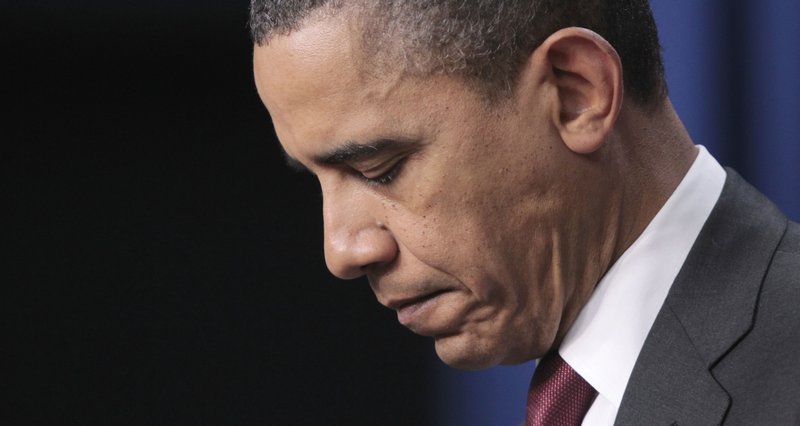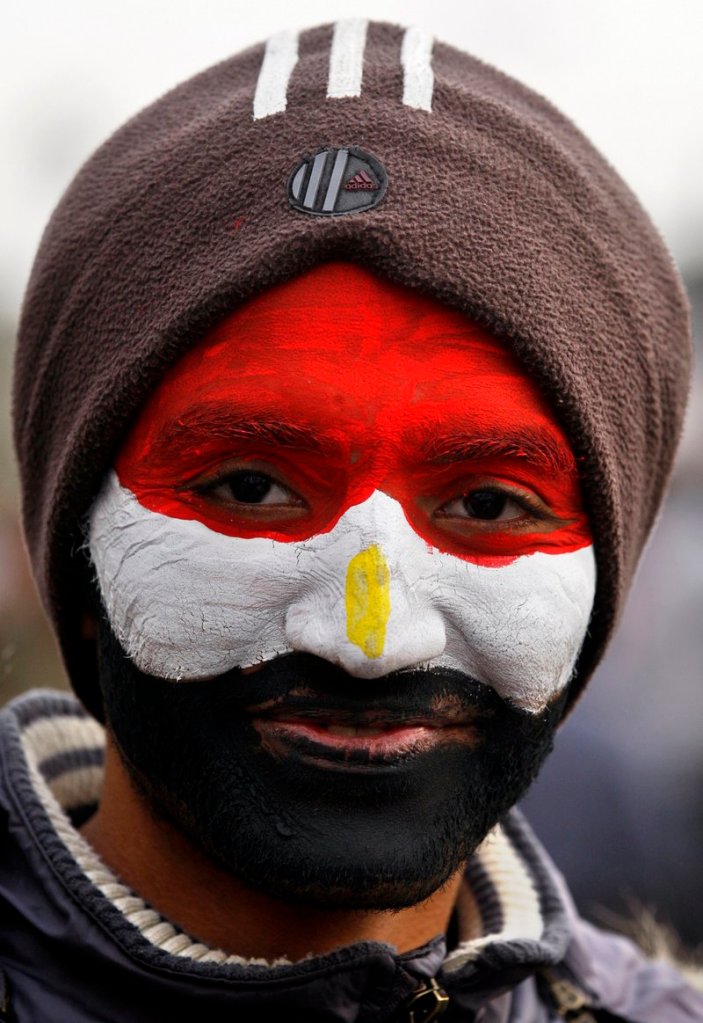CAIRO – Tentative signs of a possible solution to Egypt’s crisis began to emerge Friday, with leading pro-democracy figures surfacing to claim a role in a transition process as tens of thousands of protesters again flooded central Cairo.
The largely peaceful rally in Tahrir Square provided a much-needed burst of momentum for democracy advocates seeking to drive President Hosni Mubarak from power. Following two days of attacks by pro-government gangs, the demonstrators gathered unmolested for a “day of departure” under the watchful eye of army troops.
By the end of the day, Mubarak was still here. But the ruling clique appeared confused over how to respond to the grass-roots movement, which only seems to grow with each attempt to snuff it out, and there were indications that support for the president was wavering.
A group of about 30 Egyptian intellectuals, writers, business leaders and legal experts have met with Vice President Omar Suleiman and Prime Minister Ahmed Shafiq in recent days. The group has demanded that Mubarak turn over his authority to Suleiman, who would use it to manage a transition to democracy while Mubarak remains as a figurehead president until new elections.
“It’s basically a face-saving solution,” said Amr Hamzawy, research director for the Carnegie Middle East Center and one of the participants. Suleiman and Shafiq have been receptive, he said, and there have been “encouraging signs” from Mubarak.
Hamzawy said that the government was divided and in disarray. “There’s confusion everywhere,” he said.
In Washington, the Obama administration launched its own urgent effort to persuade opposition groups to participate in talks with Suleiman in a meeting scheduled for this morning, and called on the army and respected leaders from across Egyptian society to step forward and bless the dialogue.
“Discussions have begun,” President Obama said at a news conference. But he insisted that any solution must be determined by Egyptians themselves.
Obama, who took questions from reporters following a meeting with Canadian Prime Minister Stephen Harper, said the United States is “consulting widely within Egypt and the international community,” and repeated his insistence that Mubarak must submit to a transition “now.” He said he was “encouraged by the restraint” shown by government forces in Cairo on Friday.
At today’s meeting, the administration hopes government and opposition leaders will begin to draw the contours of a multi-step transition, including the immediate suspension of harsh emergency laws and establishment of a road map for constitutional change and free and fair elections.
Protesters have continued to insist that no dialogue can begin until Mubarak leaves office. Obama administration officials said that Vice President Joe Biden and others did not directly address Mubarak’s departure in their conversations with Suleiman, nor did Defense Secretary Robert Gates and Adm. Mike Mullen, chairman of the Joint Chiefs of Staff, raise the issue in talks with their Egyptian counterparts.
But, the officials said, Suleiman was increasingly aware that his credibility was diminishing the longer he remained tethered to Mubarak, as was the likelihood that he could serve as an acceptable alternative.
The Obama administration hopes that respected figures whom one administration official referred to as Egypt’s “wise men,” along with the army, will give credibility to a political solution if one can be negotiated.
Since its strong criticism of the violence against demonstrators, journalists and human rights leaders on Wednesday and Thursday, the administration has shifted its focus to emphasize the speed and substance of a dialogue. But while officials remained wary of pressing a specific plan, they said Mubarak’s removal from the scene, either through resignation or some unspecified means of relinquishing power to Suleiman, was key to successful talks today.
In addition to the question of what becomes of Mubarak, potential problems include a lack of recognized leaders who can speak authoritatively for the largely youthful protesters who have filled Tahrir Square, and uncertainty about whether they would accept a government under Suleiman.
“If Omar Suleiman was good for Egypt, then Mubarak would have never appointed him” vice president, said Abed el-Fateh Nabil, a 39-year-old activist who was in the square Friday. “We have been oppressed for 30 years, and we don’t want anyone linked to Mubarak — not Suleiman or anyone else.”
Still, some demonstrators suggested they would be open to having Suleiman play a central role in the transition — provided that role was temporary and that Mubarak was out of the picture.
“We can negotiate with Suleiman,” said Ahmed Mohammed, a 23-year-old architect, as he waited his turn to enter Tahrir Square. “But first Mubarak has to leave.”
Mohamed ElBaradei, the Nobel peace laureate who has become one of the faces of the protest movement, said he respected Suleiman as a party to negotiations. ElBaradei said that a transitional government should be headed by a presidential council of two or three figures, including a military representative.
He said it could take a year for constitutional reforms to be put in place for new elections, a timetable that would make the current schedule of a September vote unrealistic.
There were other signs that the balance of power is shifting toward the demonstrators.
Arab League Secretary-General Amr Moussa appeared for the first time in Tahrir Square on Friday and was given a rousing welcome by demonstrators, despite his earlier suggestion that they accept as a viable solution Mubarak’s decision to stay on until September and not run for re-election.
Mohamed Rafah Tahtawy, spokesman for al-Azhar, the state-run university that is the nation’s leading center of Sunni Islamic scholarship, announced he had resigned his post and joined the protests.
Osman Ibrahim, a retired Egyptian army general, said he took part in his first demonstration Friday. “I saw real Egyptians out there,” said Ibrahim, 57. “It’s not what we’ve been told by the Egyptian propaganda machine. These people are peaceful.”
U.S. officials noted with approval the positive response by the demonstrators to an appearance in the square by Field Marshal Mohamed Tantawi, the Egyptian defense minister. Ostensibly there to talk with the troops, Tantawi stopped to chat with a group of protesters.
Although pro-government demonstrators gathered elsewhere in Cairo, they largely pulled back from positions surrounding the square. But government-orchestrated crackdowns on foreign journalists and human rights activists continued, with reporters facing attacks from pro-Mubarak forces and hotels turning reporters out of their rooms under what managers said was government pressure.
An unknown number of journalists and rights workers remained in custody Friday night. A group of foreign researchers for Human Rights Watch and Amnesty International, detained during a Thursday raid by security forces at the Hisham Mubarak Law Center in Cairo, were released. The government continued to hold their Egyptian colleagues.
In the most serious attack on the media here Friday, the al-Jazeera television network said its Cairo office had been stormed and burned by “gangs of thugs.”
Despite the attacks and harassment, state television announced late Friday afternoon that foreign journalists were “most welcome” in Egypt.
Copy the Story Link
Send questions/comments to the editors.




Success. Please wait for the page to reload. If the page does not reload within 5 seconds, please refresh the page.
Enter your email and password to access comments.
Hi, to comment on stories you must . This profile is in addition to your subscription and website login.
Already have a commenting profile? .
Invalid username/password.
Please check your email to confirm and complete your registration.
Only subscribers are eligible to post comments. Please subscribe or login first for digital access. Here’s why.
Use the form below to reset your password. When you've submitted your account email, we will send an email with a reset code.